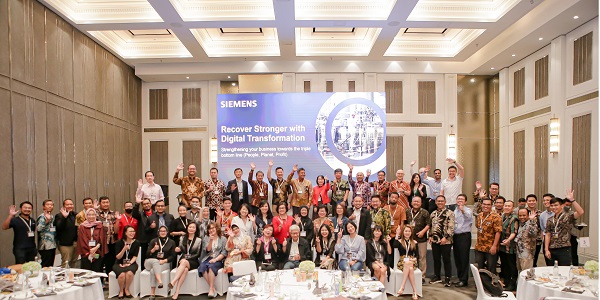
Siemens' conference “Recover Stronger with Digital Transformation - Strengthening your business towards the triple bottom line (People, Planet, Profit)” gathered some 60 participants from Indonesia's food and CPG industries.
Siemens Digital Industries Software successfully hosted the conference, “Recover Stronger with Digital Transformation - Strengthening your business towards the triple bottom line (People, Planet, Profit)”, for F&B/CPG manufacturers, at The Langham in Jakarta, on 22 February 2023.
Themed around Indonesia’s vision to digitalise key sectors of its manufacturing industry, the conference underlined the ways digital technology is driving sustainable production and innovation in many facets of the industry, and in raising profitability for SMEs.
The agenda drew out new insights from C-suite executives in the food & beverage/CPG sectors, as well as members of government, associations, and experts in the digital field.
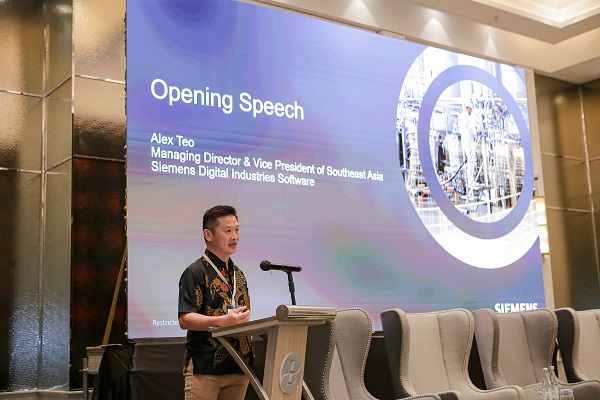
Alex Teo, Managing Director & Vice President of SEA, Siemens Digital Industries Software
Alex Teo, Managing Director & Vice President of SEA, Siemens Digital Industries Software, opened the conference on how digital transformation is changing manufacturing, and the impact on future food production.
A keynote speech from Stefanus Indrayana, Secretary General of the Indonesian Food & Beverage Association (GAPMMI), highlighted the current state of the local F&B industry, the outlook for the coming years based on the challenges and opportunities that we see today.
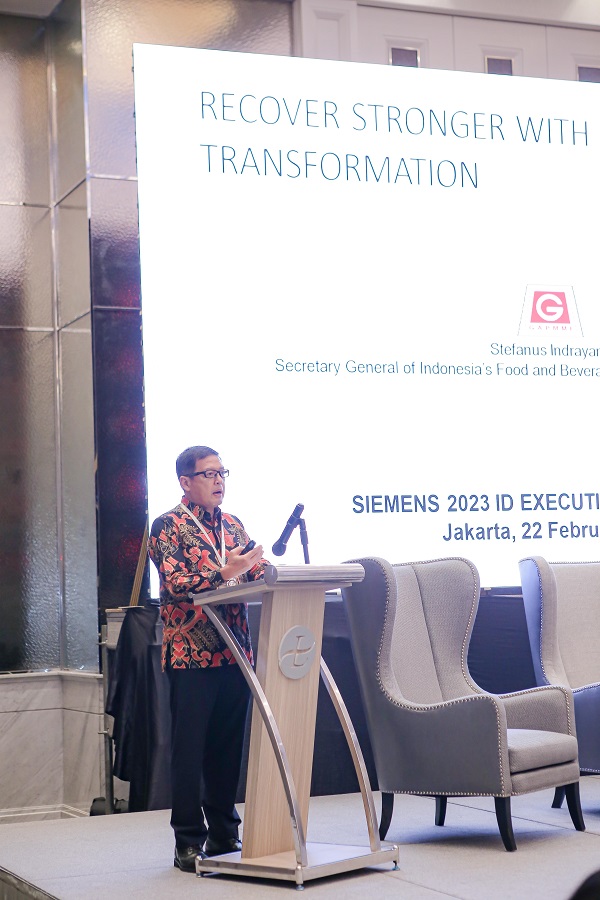
Pak Stefanus Indrayana, Secretary General of GAPMMI and Head of Corporate Communications & Sustainability PT Indofood Sukses Makmur
The panel discussions further expanded on this theme. In “Pursuing the Triple Bottle Line (People, Planet, Profit) in the Digital Age”, the panelists dissected the value of the 3Ps in manufacturing operations, and how companies can raise profitability by adopting a sustainability framework anchored on digitalisation.
This concept which is designed to measure a company’s responsibility to people (employees and consumers) and to environment, becomes even more relevant in current times when raw materials are harder to come by due to the effects of climate change, supply chain interruptions and geo-political issues. Consumers also expect brands not only to create healthier products, but to utilise new eco-friendly materials, to be environmentally conscious in their manufacturing practices.
Sharing their thoughts on this topic were Stefanus Indrayana, Secretary General of GAPMMI and Head of Corporate Communications & Sustainability PT Indofood Sukses Makmur; Faizal Safa, KADIN, Head of Permanent Committee for Industry; Hong Lei, Country Head of Digital Industries at SVP PT Siemens Indonesia, and Alex Teo, Managing Director & Vice President for Siemens Digital Industries Software in Southeast Asia.
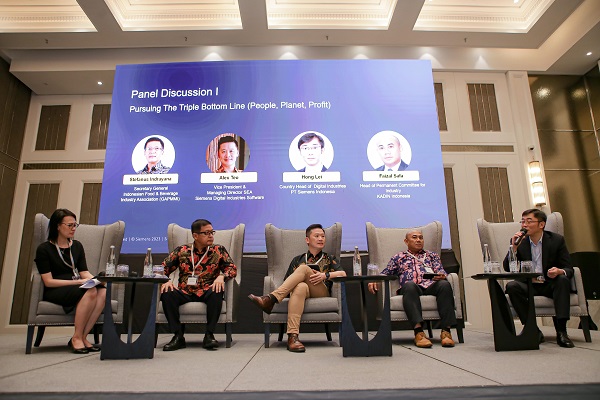
Discussion on pursuing the triple bottomline led by Ringier editor, Kathryn Gerardino-Elagio with guest panellists, Stefanus Indrayana (GAPMMI), Alex Teo (Siemens), Faizal Safa (KADIN), and Hong Lei (Siemens).
Pak Indrayana said that more and more consumers expect “companies to contribute to a better world in addressing social and environment impact.” He said that consumers will be more confident in the brand when they know the products they are consuming are produced in a sustainable manner.
Pak Hong Lei, Country Head of Digital Industries at SVP PT Siemens Indonesia, added that the COVID-19 pandemic has changed how consumers live and shop, and that digitally smart consumers are constantly switching brands. Omnichannel consumption — the blended physical and digital consumption via services like mobile shopping, curb side pickup, or social shopping — put pressure on brands to innovate in how they market to consumers. As a result of these consumer changing habits, manufacturers need to introduce new designs and concepts at shorter lead times.
When it comes to responsibility to people, the workforce and society as a whole have to benefit. According to Pak Indrayana, “Our people are our most important asset, and their competency is crucial to Indofood’s progress and success…We believe that investing in employee training is essential for the long-term success of our business, creating positive benefits for employee wellbeing and performance.” The company has been implementing e-learning to provide employees with access to skills development programs, according to Pak Indrayana.
Continuous training is effective especially in overcoming employee resistance from the shift from a traditional to a digital environment. Apart from education, Pak Faizal said that caring for employees also includes nurturing personal growth, for example, by allowing them to pursue their religious beliefs, a practice that can boost productivity and motivation in the workplace.
In caring for the planet, managing energy efficiency as well as food waste reduction remain major industry issues. According to Pak Faizal, “We are already planning to reduce our carbon footprint, and our target by 2025 is 23% of our energy consumption [will] come from green energy.”
As Indonesia enters its digital transformation phase, companies will be able to manage these goals even better. Alex Teo of Siemens explained: “By using digital technologies such as product design (formulation and packaging), Advanced Planning & Scheduling, MES, the Internet of Things (IoT) and data analytics; companies can optimise their supply chain and production processes to reduce waste and improve energy efficiency.”
He added: “Product design can help in improving the NPD/NPI processes from Design to Manufacturing by having the ability to meet regulatory compliance faster with closer collaboration with suppliers and manufacturing that improve both information and operation flow. Indirectly, it contributes to more efficient use of resources that reduces energy usage and waste reduction.
“With the impact and expansion to e-commence, the flexibility in changing production schedules quickly to meet customer demand and at the same time, the importance of providing transparency of the production would requires a flexible manufacturing approach that can be met with APS and MES,” Teo concluded.
Meaningful connections with customers
Also discussed at this conference are the emerging trends: personalisation and hyper personalisation in which companies will tailor products based on the specific needs of individual consumers. At some point, companies will consider these in developing new products with the aid of digital tools.
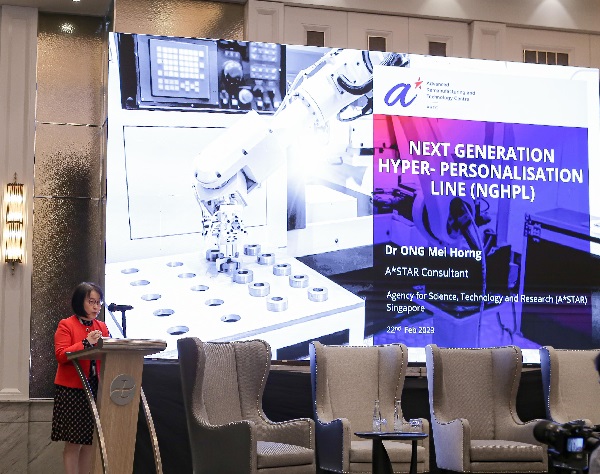
Dr Ong Mei Horng, A*Star Consultant at the Advanced Remanufacturing and Technology Centre, talks about the Hyper-personalisation (HPL).
To help them understand these strategies, Dr Ong Mei Horng, an A*Star Consultant at the Advanced Remanufacturing and Technology Centre gave a presentation on the Hyper-personalisation line (HPL). Defined, “HPL aims to incorporate hyper-personalisation capabilities through end-to-end connectivity starting from smart batch size one filling, to the use of advanced robotics capable of high mix, high speed and varying volume production”.
The second panel discussion – “Hyper personalisation - the Next Productivity Trend in F&B Industry” – further explored these trends, along with understanding today’s demanding consumer and how companies can overcome the challenges in manufacturing personalised products more effectively through digital technology.
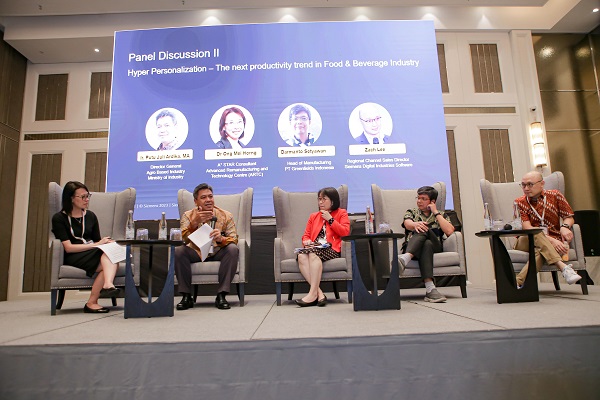
Panel discussion on hyper-personalisation, led by Putu Juli Ardika (MOI), Dr Ong Mei Horng (ARTC), Darmanto Setyawan (PT Greenfields), and Danu Setyo Nugroho (Siemens)
The panel was joined by Putu Juli Ardika from the Ministry of Industry; Darmanto Setyawan, Head of Manufacturing, PT Greenfields Indonesia; Dr Ong Mei Horng, A*Star Consultant at ARTC; Zach Lee, Regional Channel Sales Director, Siemens Digital Industries Software; Danu Setyo Nugroho, Head of Vertical Sales for Digital Industries, Siemens Indonesia.
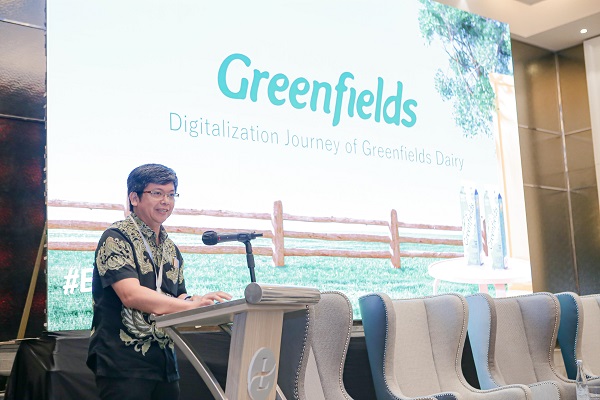
Darmanto Setyawan, Head of Manufacturing, PT Greenfields Indonesia, presenting on the company's road to digitalisation.
The consumer profile
Pak Putu said that in Indonesia consumers are already more conscious and informed than ever before, and are concerned about sustainability, transparency, and convenience.
Gen Z and millennial consumers are also referred to as “Gen P Era” where “P stands for personalisation and strong desire to customise everything; they want to exercise personal choice, uniqueness and not pre- selected or me-too, because these seemed outdated/not cool/not matching their desired image,” Dr Ong said.
But to cater to customers’ personalised taste can be a challenge for many SMEs. Even for long-time dairy company, Greenfields it can be technically ambitious, according to Pak Darmanto. “Managing increased SKU related to inventory material, formulation, production planning and scheduling and efficiency due to losses of material and change over time, is complex. The impact will be the need for more control from validating of the raw material, process control in the production and the need for more transparency, for example traceability.”
But it is a challenge with a solution.
Striking a balance personalisation and standardisation is the answer, explained Pak Zach from Siemens. “CPG manufacturers need to identify which products and features are most important to customers and focus on those, while still maintaining operational efficiency and cost-effectiveness. Depending on the company’s readiness in digitalisation, this may involve investing in technologies that enable greater customisation while streamlining production processes or partnering with third-party providers that specialise in personalisation.”
Pak Putu added that having the capability to predict consumer behaviour is key to personalisation. “Advanced analytics tools and machine learning algorithms can be used to identify patterns and trends in this data, providing valuable insights into consumer preferences and buying habits. Manufacturers can use these insights to identify emerging trends and make informed decisions about product design, marketing strategies, and supply chain management. This can lead to a more personalised and efficient customer experience, which can drive increased sales and customer loyalty.”
Product development and speed to market can be greatly enhanced when complemented with other tools such as Integrated Product Lifecycle Mgt. – that is to say 360 degrees from farm to folk/plate approach, said Dr Ong.
“Having an integrated digital solution for Manufacturing, R&D, Quality & Regulatory & Sustainability mgt systems from incoming raw, new product development, manufacturing, QC and food waste and life cycle mgt (Carbon, Water, Energy) management solutions to ensure quality and mfg. efficiency as well as working towards a net zero / zero waste/carbon neutral manufacturer, she said.
“There are now advanced digital and analytical solution e.g., AI- empowered recipe mgt software will also help to accelerate the new product development and increase speed to the market, couple with consumer data science and analytic to better understand the targeted consumer groups and their preferences. Examples, rapid microbiology and/or shelf-life tests to reduce lead time for product launch,” she said.
An MOI initiative for the industry
For the benefit of delegates, Pak Putu also shared an initiative from the MOI that will increase industry competitiveness through digital transformation. “Since 2018, the Ministry of Industry has tried to encourage the implementation of Industry 4.0 in the Food and Beverage industry sector through:
1. The appointment of Lighthouse Implementation of Industry 4.0 in the Food and Beverage Sector in Indonesia, namely PT Indolakto-Purwosari, PT. Kalbe Nutritionals, PT. Amerta Indah Otsuka, and PT. Lautan Natural Krimerindo which can be a role model for other industries to transform industry 4.0.
2. Technical Guidance on Industry 4.0 Transformation for 455 HR related to the Food and Beverage Industry and 800 HR milk cooperatives partnering with the milk processing industry. This Technical Guidance contains the main knowledge of technology, law/policy, and performance control aspects needed to prepare industrial human resources to become a motor in the application of Industry 4.0 to industrial companies.
3. To improve the supply chain of the food and beverage industry through the application of commodity balances (including sugar, meat, fish, rice, corn/maize, and alcoholic beverage raw materials) as well as to pilot partnerships and digitalisation in the milk processing industry.
4. Construction of the Innovation and Human Resources Development Center for Industry 4.0, which will provide 5 pillars of services, namely: Showcase Center, Capability Center, Industry 4.0 Ecosystem, Delivery Center, and Innovation Center.
5. In order to encourage the manufacturing industry to innovate technology, increase research activities, and increase the capacity of industrial human resources, the Government has issued incentives in the form of super deduction taxes. This tax incentive is in the form of a 200% reduction in taxable gross income from vocational and internship activities, a reduction in taxable gross income of up to 300% from research activities, and a net income tax reduction of 60% of the total investment for labor-intensive industries.
6. Indonesia will become the Official Partner Country of the Hannover Messe in Germany in 2023. Hannover Messe, the largest international exhibition in the technology and industrial solutions sector, will be used as a platform to campaign globally for Indonesia's strategic initiatives in industry 4.0. The benefits obtained from this participation are an increase in export opportunities, investment, business cooperation, and employment. The food and beverage industry will join the showdown, showcasing the transformation and innovation that have been done, as well as other advantages that we can show and share with the world.
These initiatives will no doubt accelerate the food industry’s digitalisation. While there is a long way to go, the journey has been started with these great strides. The case study presented by Pak Darmanto on PT Greenfields’ digitalisation, is an inspiring example that any food company can implement digitalisation based on their own pace.
By conducting this roundtable in Jakarta and understanding the needs of food and CPG companies, Siemens is excited to see and to be part of the advances Indonesia will accomplish in the coming years.














